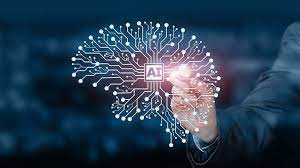By Sonny Aragba-Akpore
Sometime in June this year, a church congregation of no fewer than 300 people held service that was conducted by a robotic tool powered by Artificial Intelligence (AI).
Artificial intelligence has been prevalent in many areas of human affairs but not the church until this particular day in June at a Church in Germany when congregants sat glued to their chairs in church to listen to a sermon preached by a robot.
While this novel practice was going on ,the people were told to overlook the messenger and concentrate on the message.
This is happening in a developed country and the people in developing countries are waiting to experience this new way of life.
Described as an extraordinary convergence of technology and faith, the over 300 Protestant Christians congregated in this German city “for a unique church service orchestrated largely with AI tools. “
The service which ran for nearly 40 minutes encompassed prayer, sermons, blessings, and hymns as the parishioners shepherded by an assembly of digital disciples including four ChatGPT-led avatars, composed of two young women and two young men was an amazing encounter by the people.
Analysts say “AI isn’t confined to just Christianity, either. People are already interacting with GPT-powered versions of different deities across various religions.”
“These AI entities provide a full corpus of religious texts, and limited to a specific worldview, is hopefully unlikely to disseminate false information or biased guidance. “
This is seen as a tech-powered interpretation of divine intervention, without pesky human fallibility getting in the way.
Another analyst said that this particular leap of faith into the digital world was met with mixed reviews.
“One of the skeptics was Heiderose Schmidt, a 54-year-old IT professional, who found the AI-led sermon lacking the warmth and passion typically associated with a human pastor.”
“There was no heart or soul; the avatars displayed no emotions, had no body language, and spoke so rapidly and monotonously that it was challenging for me to concentrate on their words,” she told a News Agency in Germany.
While the world is yet to grapple with the reality of AI,this digital assembly raises the question: “Should AI have a place in the religious realm?”
“The AI’s capacity to provide accurate religious information is undeniable, but the absence of empathy—a key element of any religious leader’s makeup—presents a significant concern.”
“An AI still lacks the emotional support and leadership that often characterize human religious leaders.”
In Africa and much of the developing countries for instance where large churches are built around powerful men of God,AI may not readily have a place since activities of these large churches are woven around the founders and owners but with the rapid development of AI tools, it’s conceivable that future religious services could be conducted by robotic reverends and digital deacons.
As the German congregation’s experience illustrates, however, the path to an AI-led ecclesiastical landscape is still strewn with both curiosity and reservations.
But this goes without saying that there’s a certain divine irony to a machine delivering a sermon about the soul. And as the saying goes, “God works in mysterious ways”—and sometimes those ways could involve a few lines of code.
This possibly explains why the International Telecommunications Union (ITU) has taken up the challenge to standardize AI creation and usages in the global community.
Only last month (July,2023) governments, policy-makers, industry leaders, academics, scientists, technology innovators, civil society and the UN community met at ITU’s AI for Good Global Summit in Geneva, Switzerland. As the convenor of the event, ITU was pleased to have been able to bring these parties together to find practical applications of AI to advance the UN Sustainable Development Goals. Recognizing the urgency brought on by the emergence of generative AI and the challenges posed by AI, participants also discussed the need for guardrails and global AI governance frameworks.
A variety of ideas related to the future of AI were presented at the AI for Good Global Summit. These included setting up a registry of new or anticipated AI applications, a global observatory on AI and new institutional bodies, as well as proposals to empower existing organizations that may already have the expertise and structures to tackle challenges brought on by AI.
The ITU said It is important to analyse what’s feasible, what’s already available and what can be done so that a roadmap is created for the short, medium and long terms. Leveraging its expertise, the UN group on AI led by ITU and UNESCO is geared up to help move forward efforts on these.
The ITU said it is committed to AI standards development and capacity building, supporting responsible AI development and deployment, and driving strong collaboration with all stakeholders.
ITU documents say “We need to show the world what an inclusive, safe and responsible AI can do for humanity. Together with our UN partners, ITU will work to integrate AI capacity support into our digital transformation offerings, and we will undertake sector-focused AI readiness work in critical areas such as health, smart mobility and smart cities, and advance universal health.”
The document further says “ from here on, our work on AI at ITU, the UN system and society as a whole should only grow in intensity. While ITU focuses on ensuring that the 2.7 billion people that are offline around the world get connected to digital technologies, we are also committed to ensuring that AI serves everyone, everywhere for the greater good.”
Beautiful as AI prospects are,there are palpable fears of job losses in many areas of human endeavors.
In hospitality business for instance,robots now provide services including room service,housekeeping among others while they are also involved in logistics business,hospitals and several others.
But they may still take longer to be present in Africa and other developing economies.








